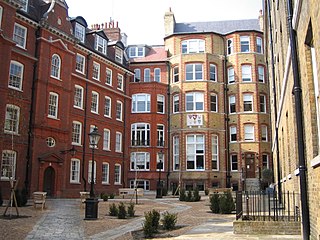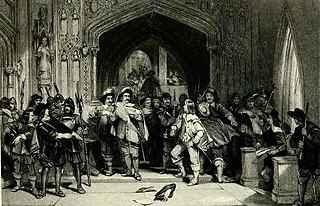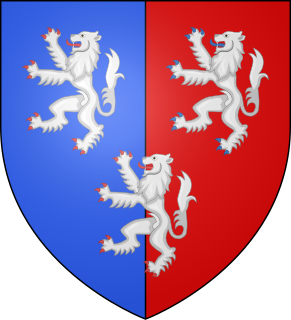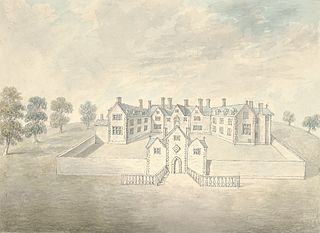Edward Vaughan (c.1600–1661) was a Welsh politician who sat in the House of Commons at various times between 1626 and 1661.

The House of Commons of England was the lower house of the Parliament of England from its development in the 14th century to the union of England and Scotland in 1707, when it was replaced by the House of Commons of Great Britain. In 1801, with the union of Great Britain and Ireland, that house was in turn replaced by the House of Commons of the United Kingdom.

Vaughan was the son of Owen Vaughan of Llwydiarth. He was admitted to the Inner Temple in November 1618. In 1626, he was elected Member of Parliament for Merioneth. [1]

The Honourable Society of the Inner Temple, commonly known as Inner Temple, is one of the four Inns of Court in London. To be called to the Bar and practise as a barrister in England and Wales, an individual must belong to one of these Inns. It is located in the wider Temple area of the capital, near the Royal Courts of Justice, and within the City of London.
Merioneth, sometimes called Merionethshire, was a constituency in North Wales established in 1542, which returned one Member of Parliament to the House of Commons of the English Parliament, and later to the Parliament of Great Britain and of the United Kingdom. It was abolished for the 1983 general election, when it was largely replaced by the new constituency of Meirionnydd Nant Conwy.
In the Civil War, Vaughan was a captain in the Parliamentary army. In 1647 he was elected MP for Montgomeryshire as a recruiter for the Long Parliament. He was a commissioner for North Wales in June 1648. He voted in the House on 7 December 1648 "that the King's answer to the proposition of both Houses was a ground for peace " and as a result was secluded under Pride's Purge and imprisoned. On 27 April 1649, the Committee for the Advance of Money ordered Edward Vaughan to be brought up in custody before them to answer certain matters touching his estates, as he had hitherto treated their orders with contempt. However he was an active commissioner of sequestration for Montgomeryshire and was "commended for his diligence in seizing delinquents's estates," by the London commissioners on 19 September 1650. [1]

Montgomeryshire is a constituency represented in the House of Commons of the Parliament of the United Kingdom. Created in 1542, it elects one Member of Parliament (MP), traditionally known as the knight of the shire, by the first-past-the-post system of election.

The Long Parliament was an English Parliament which lasted from 1640 until 1660. It followed the fiasco of the Short Parliament which had convened for only three weeks during the spring of 1640, and which in turn had followed an 11-year parliamentary absence. In September 1640, King Charles I issued writs summoning a parliament to convene on 3 November 1640. He intended it to pass financial bills, a step made necessary by the costs of the Bishops' Wars in Scotland. The Long Parliament received its name from the fact that, by Act of Parliament, it stipulated it could be dissolved only with agreement of the members; and, those members did not agree to its dissolution until 16 March 1660, after the English Civil War and near the close of the Interregnum.

Pride's Purge was an event that took place in December 1648, during the Second English Civil War, when troops of the New Model Army under the command of Colonel Thomas Pride forcibly removed from the Long Parliament all those who were not supporters of the Grandees in the New Model Army and the Independents. Some have called it a coup d'état.
He was appointed to serve as High Sheriff of Montgomeryshire for 1658 but served the office for two years 1658–1660. In 1659 Vaughan was again elected MP for Montgomeryshire. A petition by John Griffiths in November 1660 asked for "a warrant to recover from Edward Vaughan of Llwydiarth co. Montgomery, the balance of £1,600 received by him in 1648 as a commissioner for disbanding the army. He was elected MP for Montgomeryshire in Apnl 1661 for the Cavalier Parliament and sat until his death a few months afterwards." [1]
The office of High Sheriff of Montgomeryshire was established in 1541 since when a High Sheriff was appointed annually until 1974 when the office was transformed into that of High Sheriff of Powys as part of the creation of Powys from the amalgamation of Montgomeryshire, Radnorshire and Brecknockshire. Between the Edwardian Conquest of Wales in 1282 and the establishment of the High Sheriff of Montgomeryshire in 1541 the sheriff's duties were mainly the responsibility of the coroner and the Custos Rotulorum of Montgomeryshire. The Office of High Sheriff remained first in precedence in the County until the reign of Edward VII when an Order in Council in 1908 gave the Lord Lieutenant of Montgomeryshire the prime Office under the Crown as the Sovereign's personal representative.

The Cavalier Parliament of England lasted from 8 May 1661 until 24 January 1679. It was the longest English Parliament, enduring for nearly 18 years of the quarter-century reign of Charles II of England. Like its predecessor, the Convention Parliament, it was overwhelmingly Royalist and is also known as the Pensioner Parliament for the many pensions it granted to adherents of the King.
Vaughan's brother Sir Robert Vaughan by deed dated 2 February 1623 conveyed all his lands in Montgomeryshire, Denbigh, and Merioneth to him. [1]


